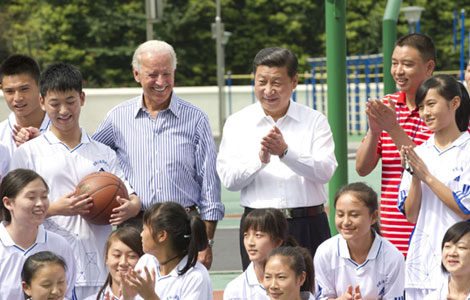Survey shows people want better relations
Updated: 2011-08-22 08:19
By Zhou Wenting (China Daily)
|
|||||||||||
BEIJING - Although a recent survey shows that people in China and Japan are suspicious of one another, journalists from both countries said they are optimistic about future relations.
"Sino-Japanese relations are still in an immature stage, so people in both countries are easily influenced by incidents," Ma Weigong, deputy editor-in-chief of China Radio International, told China Daily after a sub-forum of the media at the Beijing-Tokyo Forum on Sunday.
"We should focus more on the willingness to improve bilateral cooperation in the future, especially that expressed by young and well-educated people," he said.
The survey, which was conducted in both nations and released on Aug 11, shows that almost 29 percent of Chinese respondents had a favorable opinion of Japan following the collision between a Chinese fishing boat and two Japanese patrol vessels in waters near the Diaoyu Islands in 2010 and this year's Fukushima nuclear crisis.
The figure was 10 percent less than last year, and this year was the first reduction since the annual survey began in 2005.
In Japan, just over 20 percent of the public had a positive feeling toward China, down 6.5 percent on last year's figure.
But Ma said there is no need to pay too much attention to the fall in the figures.
Participants at the forum said the two neighbors share the common belief that the future of Asia lies in developing good ties between the two countries.
"We are interconnected like blood constantly flowing in the same vein," said Mitsuko Shimomura, former editor of Asahi Weekly. "Harm to the other hurts ourselves as well."
This view seems to be backed by people in both countries as the survey found that a considerable proportion of both the Chinese and Japanese public believe common prosperity is mutually beneficial.
The young and intellectuals, especially, want more collaboration and exchanges.
"China's young people are more sensitive and care more about what's going on in Japan, which shows promise for future friendship and mutual trust," said Liu Jiangyong, vice-dean of the institute of modern international relations under Tsinghua University.
Zhao Yijin, a 21-year-old Chinese woman who was in the audience at the conference, has been a student at Keio University in Japan for more than two years and said living in Japan has given her a real understanding of the country.
"I have the pleasant feeling of being fully accepted by my Japanese friends. They've never treated me as a foreigner in their country," Zhao said. "We are looking for more in-depth exchanges between the young people of the two countries."
Hot Topics
Anti-Gay, Giant Panda, Subway, High Speed Train, Coal Mine, High Temperature, Rainstorm, Sino-US, Oil Spill, Zhu Min
Editor's Picks

|

|

|

|

|

|






